Additional Information
Book Details
Abstract
Bringing together some of the most prominent contemporary historians of modern Germany alongside innovative newcomers to the field, this volume offers new perspectives on key debates surrounding Germany’s descent into, and emergence from, the Nazi catastrophe. It explores the intersections between society, economy, and international policy, with a particular interest in the relations between elites and the wider society, and provides new insights into the complex continuities and discontinuities of modern German history. This volume offers a rich selection of essays that contribute to our understanding of the road to war, Nazism, and the Holocaust, as well as Germany’s transformation after 1945.
Mark Roseman holds the Pat M. Glazer chair in Jewish Studies at Indiana University. His publications include A Past in Hiding, Memory and Survival in Nazi Germany, and The Wannsee Conference: A Reconsideration.
“…a rich volume that manages to be remarkably coherent and diverse at the same time…The volume covers a large range of topics in modern German history in an engaging fashion and provides much stimulation for thought and discussion.” · H-German
Hanna Schissler teaches modern history at the University of Hanover and is a Research Director at the Georg Eckert Institute in Braunschweig. Her publications include the edited volumes: The Miracle Years, A Cultural History of West Germany, and National Identity and Perceptions of the Past.
Frank Biess is Associate Professor for Modern German and European History at the University of California, San Diego. He is the author of Homecomings. Returning POWs and the Legacies of Defeat in Postwar Germany, and is co-editing a volume on the comparative history of the European “postwar” after 1945.
Table of Contents
| Section Title | Page | Action | Price |
|---|---|---|---|
| Conflict, Catastrophe and Continuity | iii | ||
| Copyright Page | iv | ||
| Contents | v | ||
| Preface | vii | ||
| Introduction | 1 | ||
| Part 1. German Elites and an Unruly Society | 25 | ||
| Chapter 1. Kulturkampf and Geschlechterkampf | 27 | ||
| Chapter 2. The 1923 Ruhr Crisis | 44 | ||
| Chapter 3. Political Violence, Gesinnung, and the Courts in Late Weimar Berlin | 60 | ||
| Part 2. German Society and a Violent Regime | 81 | ||
| Chapter 4. Beyond Conviction? | 83 | ||
| Chapter 5. The Dissolution of the Third Reich | 104 | ||
| Chapter 6. The Search for Missing Soldiers | 117 | ||
| Part 3. Change and Continuity in Germany's Foreign Relations | 135 | ||
| Chapter 7. The Kaiser and His English Relations Revisited | 137 | ||
| Chapter 8. Appeasement and Counter-Appeasement | 157 | ||
| Chapter 9. Imperialism as a Paradigm for Modern German History | 177 | ||
| Chapter 10. Americanization as a Paradigm of German History | 200 | ||
| Part 4. Smooth Surfaces, Murky Depths | 219 | ||
| Chapter 11. The Radicalization that Never Was? | 221 | ||
| Chapter 12. Germany’s Special Path? | 237 | ||
| Chapter 13. Catholic Elites, Gender, and Unintended Consequences in the 1950s | 252 | ||
| Chapter 14. Memory,Morality, and the Sexual Liberalization ofWest Germany | 273 | ||
| Chapter 15. The Modern Guild | 297 | ||
| Chapter 16. Fighting to Win the Peace | 318 | ||
| Chapter 17. Rehabilitating Fatherland | 340 | ||
| Chapter 18. Zeitgenossenschaft | 360 | ||
| Books by Volker Berghahn | 378 | ||
| Selected Readings | 379 | ||
| Contributors | 388 | ||
| Index | 395 |
